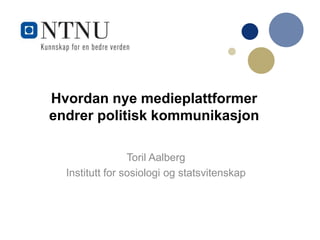
Hvordan nye medieplattformer endrer politisk kommunikasjon - Toril Aalberg
- 1. Hvordan nye medieplattformer endrer politisk kommunikasjon Toril Aalberg Institutt for sosiologi og statsvitenskap
- 2. 2 Medienes rolle i politisk kommunikasjon Tidsperiode Medienes rolle Perioden kjennetegnes av Første fase 1945 – 1957 Mediene som kanal Partikontrollert presse og radioens gjennombrudd Andre fase 1961 – 1969 Mediene som arena Svekke partipresse og introduksjon av fjernsyn Tredje fase 1973 – 1991 Mediene som aktør Oppløsning av partipressen, ”journalismen” som profesjonsideologi, TV-alderen innledes. Fjerde fase 1992 – 2009 Mediene som regissør Mediene, særlig TV, iscenesetter politikken og koloniserer offentligheten. Alternative arenaer for politisk debatt marginaliseres Femte fase 2013 Mediene som kurator Nye medier svekker portvaktrollen, velger ut, verifiserer og presenterer populært innhold
- 3. 3 Mediesfæren har endret seg fundamentalt Det politiske kommunikasjonssystemet endrer seg gjennom fremveksten av digitale, sosiale og mobile medier. Vi har som borgere mange flere muligheter til å velge og velge bort hva slags informasjon vi skal motta.
- 4. 4 Konsekvenser for måten politisk informasjon blir kommunisert og konsumert. Økte valgmuligheter. Hvordan påvirker det tilbud og etterspørsel etter politisk kommunikasjon?
- 6. 6 Nedgang i omfang? Det publiseres mer informasjon og flere nyheter om politikk enn tidligere, men fordi medietilbudet vokser, er den politiske journalistikkens relative andel redusert. De klassiske massemediene er fortsatt borgernes hovedkilde til politisk Informasjon, men etterspørsel i større grad avhengig av publikums preferanser
- 7. 7 Nedgang i kvalitet? Det er ikke dekning for å si at de politiske nyhetene er blitt dårligere eller mer tabloide, men det er grunn til å være bekymret over reduserte ressurser til journalistikk, og større grad av variasjon mellom medier. Varierer basert på tidsperiode sted/mediesystem, som også er koblet til etterspørsel.
- 8. 8 Økt mediekonsentrasjon og mindre mangfold? For å være lønnsomt i en tid med høyt press for å investere i ny teknologi, har antall fusjoner i mediesektoren økt og markedene blitt mer konsentrert, men mangfoldet har ikke blitt mindre. Mangfold skyldes ikke nødvendigvis nye plattformer eller etterspørsel: Svakere kildegrunnlag og argumentasjon i nettnyheter. Publikum etterspør det samme Men, lite systematisk forskning. Noen få eksepsjonelle casestudier. Alternative plattformer ekstra viktig i svake demokratier
- 9. 9 Økt fragmentering og polarisering? Det skjer en polarisering og fragmentering: I videste forstand tilbyr mediebransjen informasjon som går i alle retninger, og folk foretrekker informasjon som passer til deres eget syn Det store flertallet henvender seg til store nyhetsleverandører der de blir presentert for oppfatninger som strider med egne meninger. Det er ikke dekning for å si at mange lever i ekkokammer.
- 10. 10 Økt relativisme? Respekten for faktisk kunnskap er blitt mindre. Det er blitt mer akseptert at vi skal kunne føle oss frem til hva som er sant og usant. Tilliten til forskning er blitt lavere, og er hos noen erstattet av en oppfatning at man selv skal kunne velge hva som er fakta. Etterspørsel etter alternative fakta som bekrefter eget verdensbildet, men lite systematisk forskning
- 11. 11 Økt ulikhet i politisk kunnskap? Kunnskapsgapet mellom dem som vet, og dem som ikke vet, øker. Det er lettere for oss som publikum å velge bort politisk informasjon. Nye medieplattformer individualiserer mediebruken og politisk kommunikasjon. Motiv betyr mer, man snubler i mindre grad over relevant politisk informasjon.
- 12. 12 Representerer nye medieplattformer og større valgfrihet store utfordringer eller nye muligheter for det norske demokratiet? • Norge, bedre stilt enn mange andre land. Digitaliseringen mer alvorlig i liberale mediesystemer. • Fortsatt viktig med aktiv mediepolitikk • Muligheter for partiene å ta tilbake makt • Muligheter for nye aktører å komme på banen
